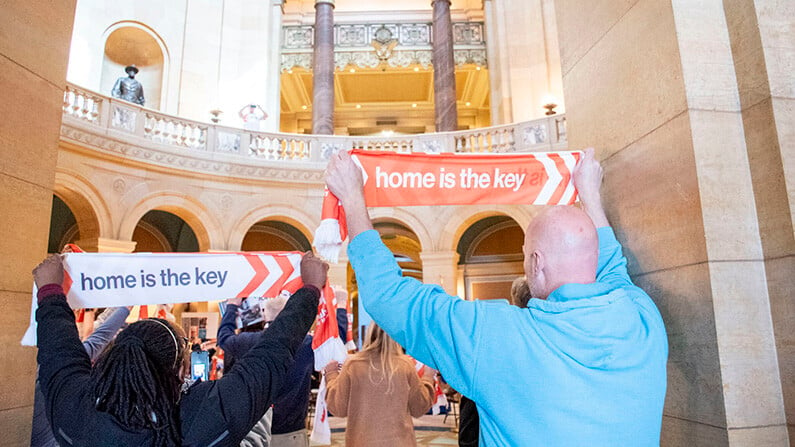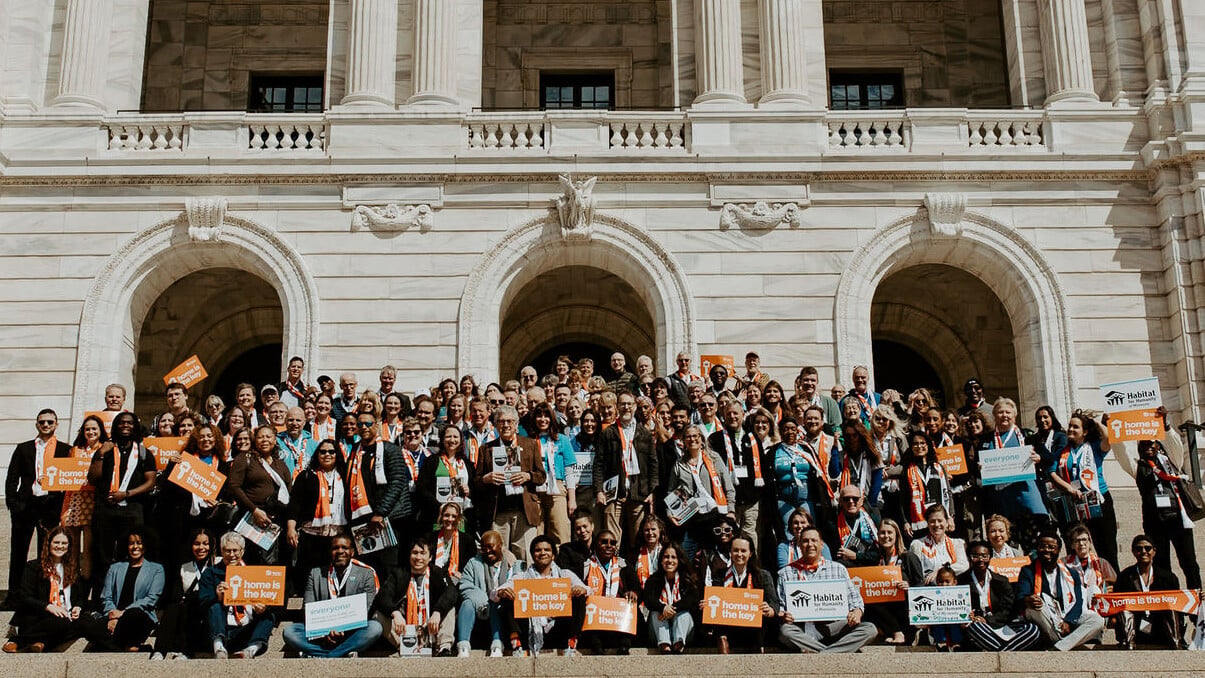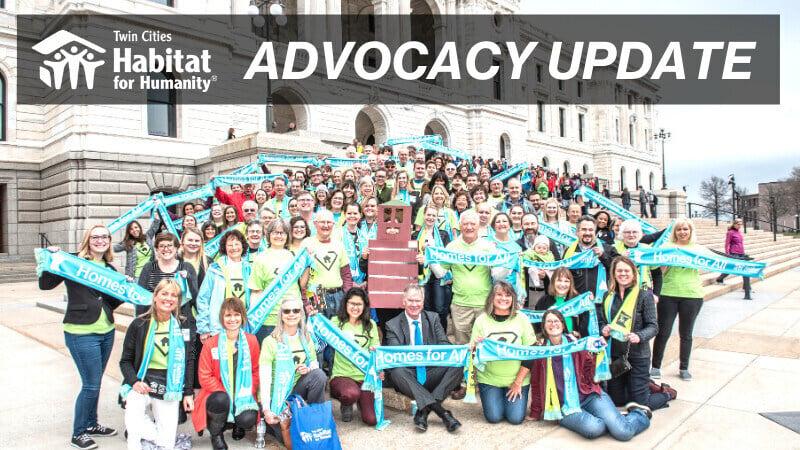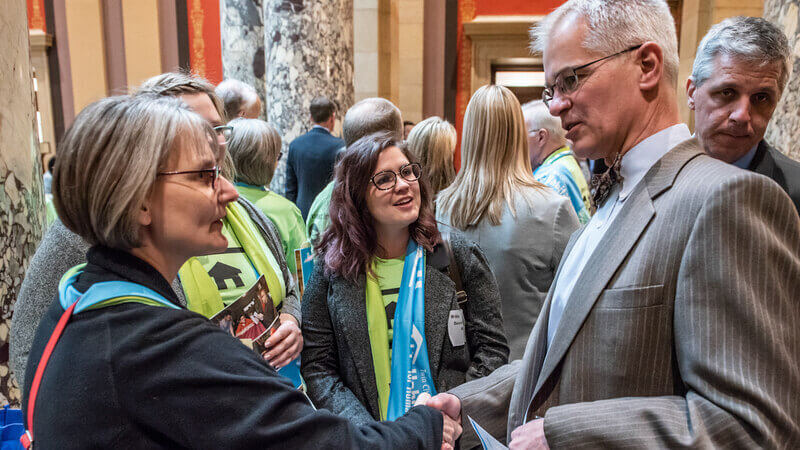Habitat's Legislative Priorities for 2022
Through all our advocacy work, Habitat strives to emphasize the importance of affordable homeownership to leaders in local, state, and federal...

Like many of us, you might feel like you’re still adjusting to the new year—but for our state lawmakers, it’s time to jump right in. The 2025 Minnesota state legislative session starts on January 14, which means we’re also preparing to get back to work and advocate for affordable homeownership.
As the landscape of the legislature changes every year, part of our work means adapting to shifting circumstances and new partisan dynamics. The legislative environment is especially different this year, and somewhat uncertain. Compared to the trifecta that Democrats have held since the 2022 elections, who controls what, and by how much, remains somewhat unclear. While we saw a split House after election day, two seats initially won by Democrats have been contested, so official margins can’t be confirmed until getting past a court ruling for one and a special election for another. In the meantime, party leaders are struggling to find consensus on how to move forward, and tension around power-sharing has heightened. The Senate is also tied due to a vacant seat, though Democrats can expect a one-seat majority once it’s filled.
 These are some of the many complex factors shaping what the start of session will look like at the Capitol. For our work, it means some things will need to be determined as we go. Flexibility, patience, and bipartisanship will be essential throughout the next few months. Some of our specific priorities will be adjusted depending on how things play out, but what is certain is our commitment to elevating affordable homeownership. We know our legislative priorities are key to building generational wealth, closing the racial homeownership gap, and strengthening our communities. We’re looking forward to emphasizing this to our leaders in state government.
These are some of the many complex factors shaping what the start of session will look like at the Capitol. For our work, it means some things will need to be determined as we go. Flexibility, patience, and bipartisanship will be essential throughout the next few months. Some of our specific priorities will be adjusted depending on how things play out, but what is certain is our commitment to elevating affordable homeownership. We know our legislative priorities are key to building generational wealth, closing the racial homeownership gap, and strengthening our communities. We’re looking forward to emphasizing this to our leaders in state government.
Our first priority this year is to reform homeowners’ associations (HOAs) in a way that protects residents’ ability to stay in their homes long term. HOAs, also known as common-interest communities, create and enforce conditions in a designated area that are beneficial to the maintenance of the neighborhood but can also be misused in ways that are challenging to residents. They can levy fines, place liens on a home, and even pursue foreclosure for residents. Our state lacks the policies and systems needed to resolve disputes, track data on HOAs, and regulate them in a way that promotes transparency and accountability. As such, we are advocating for reforming and modifying these laws.
This was also on our agenda last year, and it resulted in the creation of a working group to analyze trends and inform recommendations going forward. This year, we are hoping to build on their findings to apply reasonable standards for fines and foreclosure actions, provide services for resolving disputes, and increase consumer protections for homeowners. Our goal is to create a better system that benefits both residents and HOAs and ensures that HOAs are being used as intended: to benefit homeowners.
Like last year, a major priority this session will be securing funding for The Heights, the biggest development in our history, and where we were honored to host the 2024 Jimmy & Rosalynn Carter Work Project. In partnership with Sherman Associates and JO companies, this project in East St. Paul will provide over 1,000 housing units, new job opportunities, and public amenities on what was formerly the Hillcrest golf course.
The Heights isn’t just the biggest development in our history, it’s also the largest modern-day investment in St. Paul’s Greater East Side and will be one of the biggest affordable housing developments in the state. We are beyond excited to take part in such a transformational initiative that centers affordability, community wellbeing, and environmental sustainability. Bold initiatives like these are needed to tackle the affordable housing crisis and invest in our communities, and they aren’t possible without the help of public funding. We intend to build on the support we garnered last session from lawmakers to secure additional state funding for the construction of new homes at The Heights.
Next, a big priority this year is investing into down payment assistance (DPA) for first-generation homebuyers. Initially passed in the 2023 session, this program helps reduce barriers to homeownership exclusively for first-time buyers whose parents never owned a home or owned a home and lost it due to foreclosure. Targeted assistance like this is essential in addressing systemic inequities to housing and reducing the racial homeownership gap. We were excited to see it get across the finish line in 2023 after years of coalition advocacy. This year, we want to make sure this initiative continues to be funded, so we are advocating for the investment of $25 million into the Community DPA Fund in FY26 and $50 million in FY27. First generation DPA initially received $100 million in appropriations in the 2023 session.
Homebuyers who qualify for this assistance can receive help with a down payment of 10% of the cost of purchasing their home. This assistance will help close the affordability gap, support consumer choice, and provide more resources to those who do not have access to generational wealth. 
Carroll became a Habitat homeowner in 2023.
Lastly, we are advocating to increase appropriations for a program called Homeowner Education, Counseling, and Training, also known as HECAT. Funds from this program can be used to provide a range of resources and services, including pre-purchase counseling, homebuyer education, and foreclosure prevention. These services are vital to our work not only to produce new housing but also to preserve affordable homeownership, to ensure that our clients are well prepared during and after the buying process, and to help achieve long term affordability. As such, we are advocating to increase appropriations for HECAT to $4 million.
Despite some loose ends and political tensions, there’s still a lot to be done this year. We rely on advocates like you to show how much support there is for affordable homeownership. Sign up for advocacy action alerts to stay informed throughout session and alerted to ways you can help advance our priorities. Soon, we’ll also open registration for Habitat on the Hill Minnesota 2025; we hope you can join us at the Capitol to advocate in person with your lawmakers.

Housing advocates gather on the steps of the Minnesota Capitol during our 2024 Habitat on the Hill advocacy day.
Your gift unlocks bright futures! Donate now to create, preserve, and promote affordable homeownership in the Twin Cities.

Through all our advocacy work, Habitat strives to emphasize the importance of affordable homeownership to leaders in local, state, and federal...

Guest Blog by Idil Dirie, Capitol Pathways Intern Each year, hundreds of families partner with Twin Cities Habitat for Humanity through our...

Minnesota’s 2024 legislative session starts on February 12, and Twin Cities Habitat is ready to dive in to advocate for affordable homeownership....